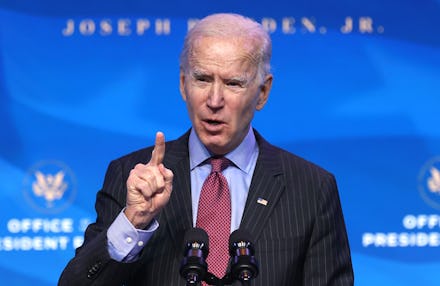Biden plans to ditch a Trump policy that is holding back millions of coronavirus vaccine doses

Despite having two approved coronavirus vaccines in the United States, the country is far behind its vaccination schedule. Many people who hoped to receive a vaccine by summer have had their dreams dashed. However, with a new president comes a new administration and updated distribution plans. And late last week, President-elect Joe Biden announced plans to speed up vaccine distribution by ditching a Trump administration policy that is keeping millions of doses in reserve.
Originally, President Trump claimed that his distribution strategy, dubbed Operation Warp Speed, would vaccinate 20 million people by the end of 2020. But nearly two weeks into 2021, the U.S. is nowhere near those numbers. Per the CDC's COVID Data Tracker, only 6.8 million people have received their first vaccine dose so far. What's notable, however, is that the CDC reports there are 22.1 million doses distributed. So, why aren't those doses going to anybody?
When most people think of vaccines, they think of a one-time shot like the flu vaccine. That isn't the case with Pfizer/BioNTech and Moderna's coronavirus vaccines, though. Both vaccines require second doses, administered several weeks after the initial dose, to be effective. With that in mind, the Trump administration has reserved half of the U.S.'s vaccine supply to ensure that people can complete the two-dose sequence.
On Friday, Biden announced that when he takes office, he will release nearly all vaccines to the public. TJ Ducklo, a spokesman for Biden's transition, told CNN, "The president-elect believes we must accelerate distribution of the vaccine while continuing to ensure the Americans who need it most get it as soon as possible. He supports releasing available doses immediately, and believes the government should stop holding back vaccine supply so we can get more shots in Americans' arms now."
There are concerns about whether or not Biden's plan could lead to a vaccine shortage. Michael Pratt, a spokesman for Operation Warp Speed, told CNN, "If President-elect Biden is calling for the distribution of vaccines knowing that there would not be a second dose available, that decision is without science or data and is contrary to the FDA's approved label. If President-elect Biden is suggesting that the maximum number of doses should be made available, consistent with ensuring that a second dose of vaccine will be there when the patient shows up, then that is already happening."
However, it's clear that Operation Warp Speed's current distribution plan isn't working. While there are a multitude of factors to blame beyond keeping doses in reserves — like the federal government placing the onus of vaccine distribution on individual states — the reserves have come under previous criticisms from public health experts. Axios reported that former FDA commissioner Scott Gottlieb said, "I don't know that you need to distribute everything, but you don't need to stockpile 55%." And although Biden won't release additional details on his plans until he takes office on Jan. 20, he announced his intention to invoke the Defense Production Act to produce vaccine materials along with personal protective equipment last month.
There is some research that supports Biden's plans. Last week, authors of a study published in the journal Annals of Internal Medicine wrote, "We find that under most plausible scenarios, a more balanced approach that withholds fewer doses during early distribution in order to vaccinate more people as soon as possible could substantially increase the benefits of vaccines, while enabling most recipients to receive second doses on schedule."